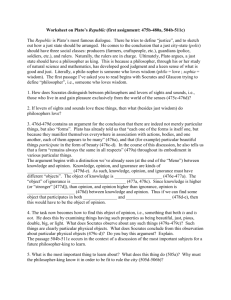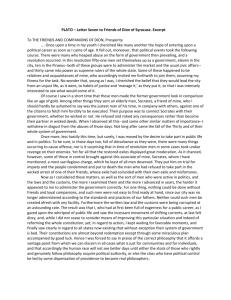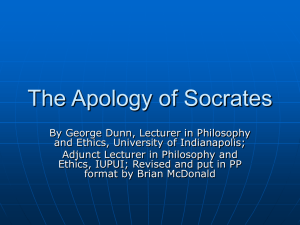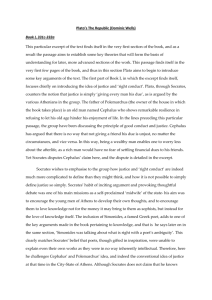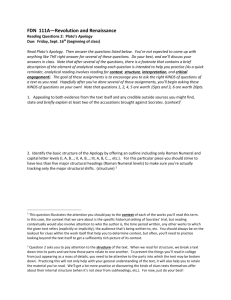Apology - Valdosta State University
advertisement
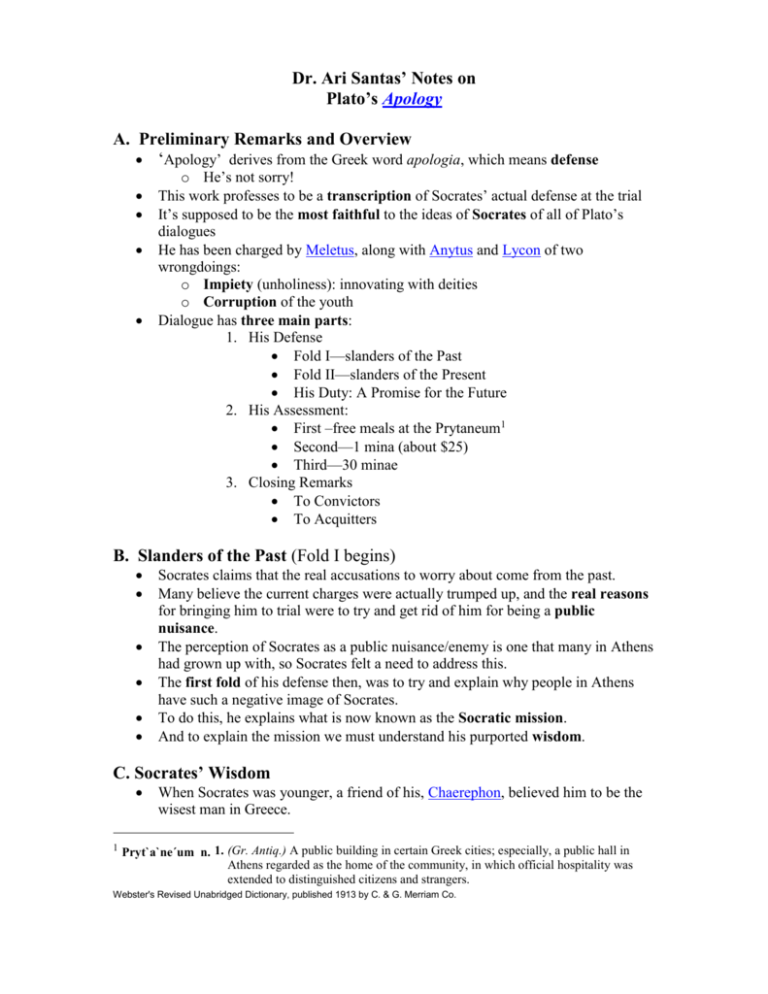
Dr. Ari Santas’ Notes on Plato’s Apology A. Preliminary Remarks and Overview ‘Apology’ derives from the Greek word apologia, which means defense o He’s not sorry! This work professes to be a transcription of Socrates’ actual defense at the trial It’s supposed to be the most faithful to the ideas of Socrates of all of Plato’s dialogues He has been charged by Meletus, along with Anytus and Lycon of two wrongdoings: o Impiety (unholiness): innovating with deities o Corruption of the youth Dialogue has three main parts: 1. His Defense Fold I—slanders of the Past Fold II—slanders of the Present His Duty: A Promise for the Future 2. His Assessment: First –free meals at the Prytaneum1 Second—1 mina (about $25) Third—30 minae 3. Closing Remarks To Convictors To Acquitters B. Slanders of the Past (Fold I begins) Socrates claims that the real accusations to worry about come from the past. Many believe the current charges were actually trumped up, and the real reasons for bringing him to trial were to try and get rid of him for being a public nuisance. The perception of Socrates as a public nuisance/enemy is one that many in Athens had grown up with, so Socrates felt a need to address this. The first fold of his defense then, was to try and explain why people in Athens have such a negative image of Socrates. To do this, he explains what is now known as the Socratic mission. And to explain the mission we must understand his purported wisdom. C. Socrates’ Wisdom 1 When Socrates was younger, a friend of his, Chaerephon, believed him to be the wisest man in Greece. Pryt`a`ne´um n. 1. (Gr. Antiq.) A public building in certain Greek cities; especially, a public hall in Athens regarded as the home of the community, in which official hospitality was extended to distinguished citizens and strangers. Webster's Revised Unabridged Dictionary, published 1913 by C. & G. Merriam Co. To test this view, Chaerephon went to the Oracle at Delphi and asked the priestess there (the Pythian) if any man was wiser than Socrates. The reply was: no man was wiser. When Socrates heard of this, he was puzzled. o On the one hand, Socrates knew that Apollo, the god of the oracle, would not lie. o On the other hand, Socrates had never considered himself very wise at all. He always considered himself unwise, since he never professed to know very much. o Socratic skepticism D. The Oracle To make matters worse, the oracle at Delphi was not only prominently significant historically, but infamous for misleading answers to questions posed. Its motto was ‘know thyself’ or alternatively, ‘nothing to excess.’ For example, there are two famous misinterpretations of the Oracle’s answer: o Oedipus, mythical king of Thebes Will kill father and marry mother Know thyself! o Croesus, king of Lydia A great kingdom will fall Know thyself! Socrates, knowing these tales, wanted to know what the Oracle could mean. E. The Initial Mission Mindful of the ambiguity of the oracle’s answers, and unconvinced that he was the wisest, Socrates decided to investigate the meaning of wisdom. He went to those who were reputed wise – politicians, poets, craftsmen – and questioned them for signs of wisdom o What he found out is that they knew no more about truth, beauty and goodness than he did. o The more they professed to know, the less they did know. o The difference between Socrates and them is that Socrates didn’t pretend to know what he didn’t. Based on these results, he realized the meaning of wisdom: o Human wisdom = the acknowledgment of one’s ignorance This is called Socratic Irony. So, the meaning of the Oracle’s decree was this: o No man is wiser than he, who, like Socrates, is willing to admit his ignorance compare to the Delphic Oracle’s ‘Know thyself’ F. The Revised Mission After figuring out the meaning of the riddle, Socrates decided that there must be a point to the message – one that others should know of. His mission now became an evangelical one – to show others the importance of admitting one’s limitations. o His goal was now to fight arrogance & dogmatism. o His means was the method of questioning those who portend to know. Later in his defense he describes himself as a (social) gadfly: o He buzzes around and stings the people of Athens with his questions. o Like a noble but lazy horse, the people wake up and become active again. o But though they are the better for it, they are annoyed at the source of their awakening. The Athenians mistook this for sophism – an attempt to undermine Athenian values, especially since his young associates imitated him. G. Slanders of the Present (Fold II Begins) Socrates now turns to his present accusers, who in his eyes, are rationalizing a case against him because of the slanders of the past. This begins the second fold of his defense. He questions Meletus to test the validity of his charges (are his reasons excuses?). He proceeds in his ‘usual manner,’ which riles up the audience and the jury. The use of the method is probably what got him there in the first place. Today such cross-examination is the norm, but in his day, it was Socrates’ idiosyncrasy. H. The Corruption Charge 1. Who Improves Them? Socrates asks Meletus, if I corrupt the youth, who improves them? Meletus says the jury, and the assembly, and the audience, and the Councilors, and . . . everyone except Socrates. Socrates says this is silly – who can believe that only one man corrupts the youth, and his actions single-handedly have produced rampant corruption. (reductio ad absurdum) Socrates concludes that Meletus is not seriously concerned with the youth. 2. Why Corrupt Your Own Associates? Socrates then asks if corrupting your associates doesn’t bring harm to yourself. o Meletus admits that it does. Then Socrates asks if he is corrupting the youth willingly or unwillingly. o Meletus says willingly. Socrates points out that it would be stupid to do this, for no one would willingly bring harm to oneself. Presents a dilemma: Either I did it unwillingly – or not at all. Either way, I should not be punished. I. Atheism Charge He then considers the charge of impiety. Socrates asks Meletus, if the charge is that he believes in false gods or no gods at all. Meletus says no gods at all – atheism Socrates then gets Meletus to admit that anyone who believes in divine affairs believes in divinities. o Like belief in children of the gods implies belief in gods. But in Meletus’ sworn deposition, he states that Socrates busies himself studying those things above the sky and below the earth. o Being an innovator in religious matters. So, Meletus is contradicting himself: Socrates believes in divinities and doesn’t believe in them. (reduction ad absurdum) J. Socrates’ Promise for the Future Socrates reaffirms that he is not guilty of any wrongdoing and that he will continue to question people if released. o If you release me it must be with the understanding that I will never give up my mission. Socrates thought he had a divine mission and told the jury that his duty to Apollo is greater than that which he has to them. o His duty: To show people their limitations To prod them to pursue virtue, not wealth To prod them to improve their selves, rather than put down others Socrates, though skeptical of theoretical conceptions of the cosmos, was certain of some practical human truths. o We must never do wrong intentionally. o We must never disobey our superiors. “With respect, I will obey Apollo rather than you!” K. What should we fear? Socrates will not give up his duty even if he is threatened by death. As a good soldier must stay at his post to face the enemy, so must he. This he believes with his deeds as well as with words. o Socrates’ military service as a hoplite soldier. o Defiance of the council The ten generals o Defiance of the Oligarchy of Thirty Tyrants Collecting Leon of Salamis Fear of death did not keep him from doing what he felt is right in the past, and it will not now. Death is something (he says) he couldn’t care less about, but doing wrong is something he fears. L. Who will be harmed? Socrates claims that he will not be harmed by Meletus, even if he is convicted, even if he is put to death. o What does he mean by this? On the other hand, Meletus will be the one who is harmed o What does he mean by that? In closing, Socrates tells the jury that they should not acquit him, not because this will harm him, but because it will harm them. o What does he mean by this? o Harm to souls (the oath of justice) o Harm to city (ruin a god-given service from city) They convict him. M. Socrates’ Assessment The jury voted and convicted him by a somewhat small margin. Meletus suggests the death penalty. Socrates, before giving his assessment, reminds them that the penalty should reflect what the convicted deserves. Since he believes he’s done nothing wrong, but rather that he’s provided Athens with a valuable service he assesses thus: 1. Free meals at the Prytaneum – the town hall! o Then he back off and says: 2. I’ll pay one mina of silver ($25) o Then his friends nudge him and he says: 3. They’ll pay 30 minae of silver for me. By this time the jury is furious and sentences him to death. N. Closing Remarks to Convictors The reason why I was convicted was that I was too honest to tell you what you wanted to hear. o No apologies. o No appeals to emotion. I state my case as I saw it (as it is!), and I expected that the truth would convince you if you were willing to listen and find it. I have no regrets about dying because some things are worth dying for. It’s better to die being true to one’s beliefs than to live a dishonest existence. As for you, you haven’t seen the last of the likes of me! o The curse of philosophy! Can kill men, but not ideas. There’ll be more of us (Aristotle was brought to trial later on). O. Closing Remarks to Acquitters Have no fear, I know I did the right thing. My little voice – my divine sign – never opposed me at all throughout the trial. It’s never let me do the wrong thing before, so I know it wouldn’t have now. As for death, there’s nothing to fear about it. o Either it’s a shift into nothingness – a long and dreamless sleep o Or it’s a journey to another place. If it’s nothingness, there’s nothing to fear. If it’s a journey to another place, there’s only good to be found – I can examine all the old heroes and demigods and learn more of wisdom.



